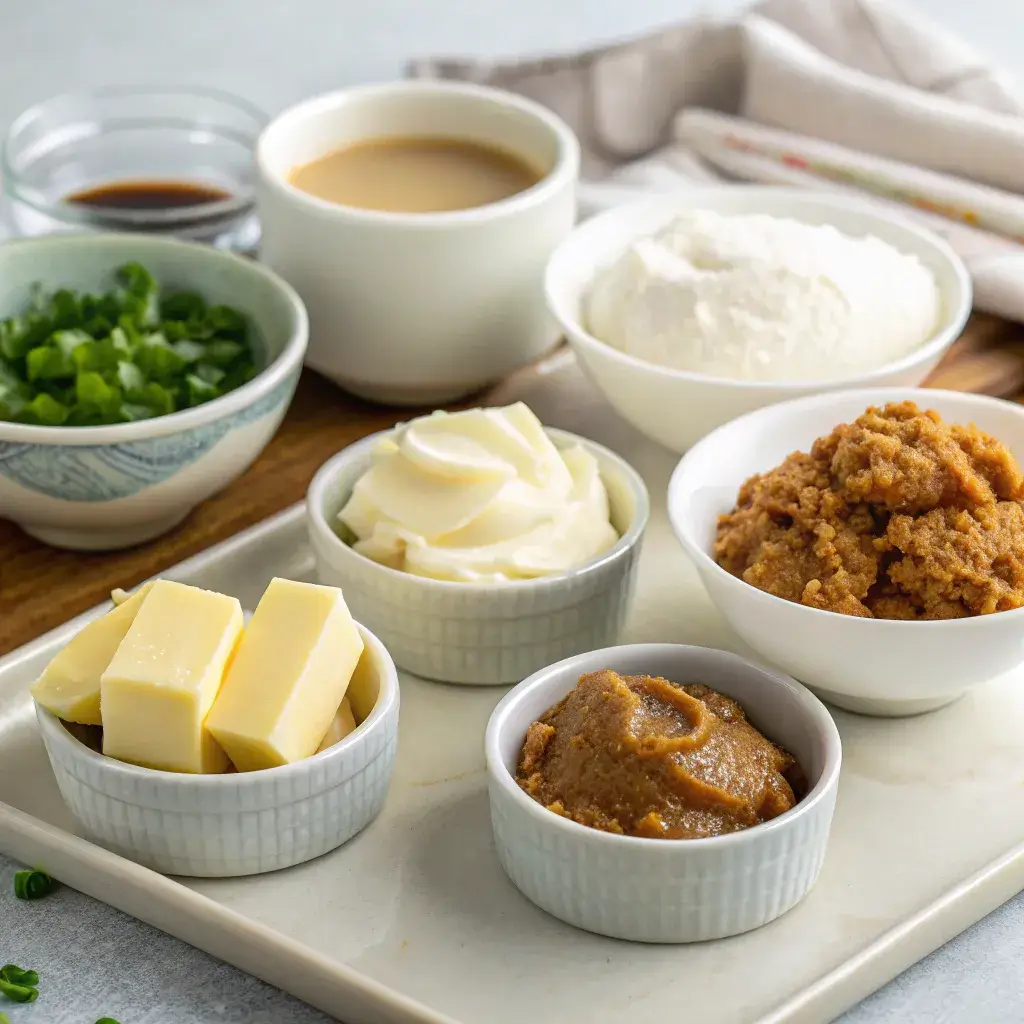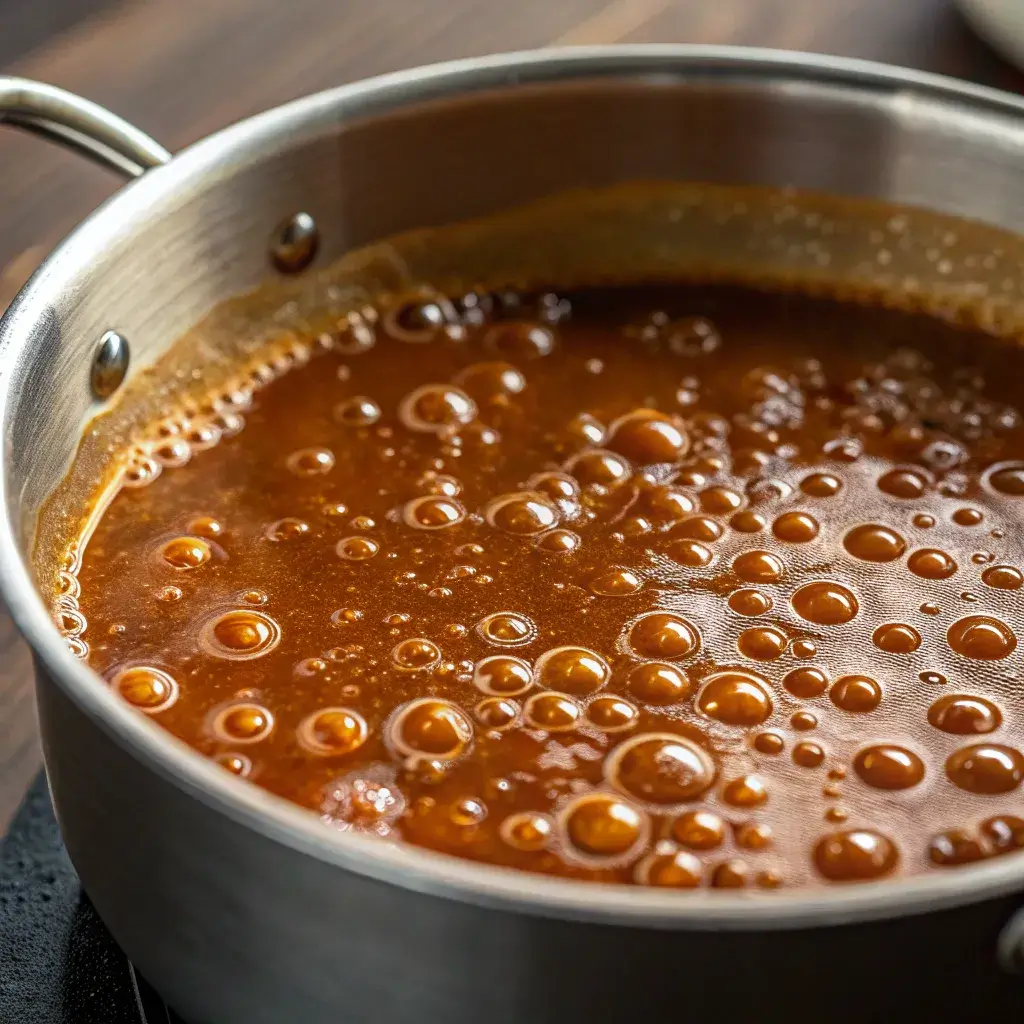Miso caramel is the rich, salty-sweet sauce you didn’t know your gluten-free kitchen needed. At Recipes of Kitchen – The Gluten-Free Sweet Kitchen, I’ve always believed that baking without gluten shouldn’t mean baking without bold, surprising flavors. I’m Lidia Bellacci, and this unique fusion of umami-packed miso and buttery caramel has become one of my favorite ways to elevate everyday desserts.
Inspired by Japanese flavors and modern baking trends, miso caramel brings deep richness and complexity to everything from brownies to roasted fruits. It’s a game-changer for gluten-free bakers looking to create treats that go beyond the ordinary.
What Is Miso Caramel? A Flavor Fusion Revolution
The Rise of Umami in Modern Desserts
For decades, dessert has been dominated by sweet, creamy, and fruity notes. But in recent years, chefs and bakers alike have been reaching beyond sugar for more complex flavors. Enter umami — the fifth taste, known for its savory, rich depth. Miso, a traditional Japanese fermented soybean paste, is packed with umami, and when blended with caramel’s sweet, buttery tones, it creates an unforgettable sauce.
This sweet-savory pairing isn’t just a trend; it’s a culinary breakthrough. Miso caramel taps into the global palate’s evolving preference for layered flavor experiences — much like salted caramel did years ago, but with more depth and character.
Miso Caramel: Origins and Cultural Influence
Miso itself has been a staple in Asian cuisine for centuries, commonly used in soups, marinades, and sauces. But its leap into the dessert world happened more recently, as Japanese and Korean pastry chefs began incorporating it into sweets. The idea caught on quickly in the West, especially in artisanal and gourmet baking circles.
In fusion kitchens, miso caramel became a favorite for its ability to elevate traditional recipes into modern, complex delights. It found a place not only in high-end restaurants but also in home kitchens — especially among curious, health-conscious bakers looking for clean, bold flavors. It’s especially versatile in gluten-free baking, where bold flavors help build richness without the crutch of wheat-based textures.
Now, whether you’re a gluten-free baker, a sweet tooth adventurer, or just someone who loves trying something new, miso caramel is here to elevate your next treat.
Print
Miso Caramel
- Total Time: 15 minutes
- Yield: 1 cup 1x
- Diet: Vegetarian
Description
A rich and deeply flavorful miso caramel sauce that combines the sweetness of caramel with the savory umami of miso — perfect for drizzling over desserts, ice cream, or fresh fruit.
Ingredients
1 cup granulated sugar
1/4 cup water
1/2 cup full-fat coconut milk or heavy cream
2 tbsp white miso paste
2 tbsp unsalted butter or vegan butter
1/2 tsp vanilla extract
Instructions
1. In a medium saucepan, combine the sugar and water over medium heat. Stir just until the sugar dissolves.
2. Stop stirring and let the mixture boil undisturbed until it turns a deep amber color, about 6–8 minutes. Watch carefully to avoid burning.
3. Remove from heat and carefully whisk in the coconut milk or cream — it will bubble up vigorously.
4. Add the butter and whisk until smooth.
5. Whisk in the miso paste and vanilla extract until fully incorporated.
6. Let cool slightly before using. The caramel will thicken as it cools.
7. Store in a sealed container in the refrigerator for up to 2 weeks. Reheat gently to serve.
Notes
White miso provides a balanced, subtle umami flavor without overpowering the sweetness.
You can use heavy cream and regular butter if dairy is preferred.
Delicious over ice cream, brownies, roasted fruit, or stirred into coffee.
To make it saltier, increase the miso paste slightly to taste.
- Prep Time: 5 minutes
- Cook Time: 10 minutes
- Category: Condiment
- Method: Stovetop
- Cuisine: Fusion
Nutrition
- Serving Size: 1 tablespoon
- Calories: 80
- Sugar: 10g
- Sodium: 90mg
- Fat: 4g
- Saturated Fat: 3g
- Unsaturated Fat: 1g
- Trans Fat: 0g
- Carbohydrates: 11g
- Fiber: 0g
- Protein: 0g
- Cholesterol: 5mg
Keywords: miso caramel, umami caramel sauce, dairy-free caramel, Japanese-inspired dessert
Miso Caramel Ingredients and How It’s Made
What Is Miso Caramel Made Of?
At its core, miso caramel is a simple blend of just a few ingredients—but each one plays a vital role in achieving that perfect sweet-meets-savory balance. Here’s what goes into it:
| Ingredient | Purpose |
|---|---|
| Sugar | Base sweetness, caramelizes to deepen flavor |
| Butter | Adds richness and smooth texture |
| Heavy Cream | Balances consistency and creaminess |
| White Miso Paste | Adds salty umami depth and complexity |
| Vanilla Extract | Optional, for a warm aromatic finish |
White miso is the most commonly used in miso caramel. It’s milder and slightly sweet compared to red or dark miso, which can overpower desserts. The miso paste melts seamlessly into the caramel, giving it a layered, rounded flavor without tasting overtly like soybeans.

Understanding the Components: Miso Paste, Sugar, Cream, and Butter
Miso Paste
Made from fermented soybeans (and often rice or barley), miso is traditionally used in savory Japanese dishes. It’s packed with natural umami and adds depth when used in unexpected ways—like in desserts. In caramel, it serves the same role as sea salt in salted caramel but offers even more complexity.
Sugar + Butter + Cream
This trio forms the base of most caramel sauces. Sugar provides sweetness and body, while butter adds richness and softens the texture. Cream thins the mixture and gives it a luscious mouthfeel.
Vanilla Extract
Though optional, a splash of vanilla can round out the flavor and complement the miso’s slight tang.
When combined, these ingredients create a caramel sauce that is both comforting and intriguing, perfect for spooning over cakes, drizzling onto pancakes, or folding into cookie dough.
All About Miso: The Fermented Star
What Is Miso Made Of?
Miso is a traditional Japanese paste made by fermenting soybeans, often with rice or barley, using a specific mold called koji (Aspergillus oryzae). Salt and time are key to the process—fermentation can take anywhere from a few weeks to several years, depending on the variety.
Here’s a quick look at miso’s core ingredients:
| Ingredient | Role in Fermentation |
|---|---|
| Soybeans | Protein-rich base |
| Rice/Barley | Adds carbohydrates and texture |
| Koji Culture | Initiates fermentation and adds umami |
| Salt | Preserves and controls fermentation rate |
The longer the fermentation, the darker and more intense the miso becomes. But not all miso is the same — and when it comes to miso caramel, choosing the right one matters.
Types of Miso: White, Yellow, Red, and Their Culinary Roles
There are three main types of miso, and each brings a different flavor profile to your kitchen:
| Type | Color | Taste | Best Uses |
|---|---|---|---|
| White Miso (Shiro) | Pale yellow to beige | Mild, slightly sweet | Ideal for miso caramel, dressings, glazes |
| Yellow Miso (Shinshu) | Light brown | Balanced, a bit stronger | Good for soups and marinades |
| Red Miso (Aka) | Deep red-brown | Bold, salty, earthy | Use sparingly; not ideal for sweet dishes |
For miso caramel, white miso is the go-to. Its mild flavor allows the buttery sweetness of caramel to shine, while still lending a subtle umami depth.
The Flavor Profile: What Does Miso Caramel Taste Like?
What Flavor Is Miso?
Miso has a bold, unmistakable flavor that combines salty, earthy, nutty, and slightly tangy elements. Depending on the type and fermentation length, it can taste mild and sweet (like white miso) or rich and pungent (like red miso).
But there’s one thing miso is always rich in: umami — the savory “fifth taste” that lingers and adds depth. It’s this complex, aged flavor that makes miso a standout ingredient, even in sweet dishes.
How Miso Enhances the Depth of Caramel
When added to caramel, miso doesn’t just replace salt — it amplifies the entire flavor experience. The buttery sweetness of caramel becomes more complex, with every bite delivering waves of sweet, salty, and savory notes.
Think of it like salted caramel but more mature and nuanced. The miso smooths out the sweetness, prevents cloying flavors, and adds a subtle richness that keeps you coming back for another spoonful.
How to Make Miso Caramel at Home (Step-by-Step Guide)
Tools and Ingredients Needed
Before you get started, gather these tools and ingredients:
Tools:
- Heavy-bottomed saucepan
- Heat-proof spatula or wooden spoon
- Whisk
- Measuring cups/spoons
- Mason jar or glass container (for storage)
Ingredients:
- 1 cup granulated sugar
- 6 tbsp unsalted butter (cut into cubes)
- ½ cup heavy cream
- 1–1½ tbsp white miso paste
- ½ tsp vanilla extract (optional)

Step-by-Step Miso Caramel Recipe Instructions
- Melt the sugar
Heat the sugar over medium heat in a dry saucepan. Stir occasionally until it melts into an amber-colored liquid. Be patient — don’t rush this stage. - Add butter
Once the sugar is melted, add the butter carefully. It will bubble vigorously. Stir constantly until fully melted and smooth. - Pour in cream
Slowly add the heavy cream, stirring continuously. Allow the mixture to boil for 30 seconds, then remove from heat. - Whisk in miso
Off the heat, add the miso paste and whisk until fully combined. This is where the umami magic happens. - Add vanilla (optional)
Stir in the vanilla extract for extra warmth and aroma. - Cool and store
Let the sauce cool slightly before transferring it to a glass jar. Store in the refrigerator for up to 2 weeks.
Pro Tip: Want it thicker? Let it boil a little longer. Want it saltier? Add a pinch of flaky sea salt or increase the miso slightly.
Creative Ways to Use Miso Caramel Sauce
What to Do with Miso Caramel Sauce?
So you’ve made your batch of miso caramel—now what? Here are 10 irresistible ways to use it:
- Drizzle over vanilla ice cream
- Swirl into brownies or blondies
- Pour over baked apples or pears
- Use as a glaze for roasted sweet potatoes
- Mix into lattes or hot chocolate
- Spoon over gluten-free pancakes or waffles
- Layer in parfaits or trifles
- Use as a dip for fresh fruit
- Fill thumbprint cookies
- Glaze roasted nuts for a snack with a twist
Sweet and Savory Pairings to Try
While most people use miso caramel for desserts, don’t be afraid to get creative. Try it as a glaze for:
- Grilled pork or chicken
- Roasted carrots or squash
- Brushed on toast with cream cheese

The rich balance of sweet and savory allows it to shine in unexpected places.
Pairing Ideas for Miso Caramel in Desserts & Beyond
Best Dessert Pairings: Ice Cream, Brownies, Pancakes
One of the best things about miso caramel is how effortlessly it blends into both classic and creative dessert pairings. Here are some favorites:
- Vanilla Ice Cream: A drizzle of warm miso caramel transforms a simple scoop into a restaurant-worthy treat.
- Gluten-Free Brownies: Swirl it into the batter before baking or drizzle on top after cooling.
- Pancakes & Waffles: Use it in place of maple syrup for a bolder breakfast flavor.
- Tarts & Cheesecakes: Spread a thin layer of miso caramel over the top before serving for an elevated finish.
- Apple Crumble or Baked Bananas: Add contrast to warm, fruity desserts.
Each of these pairings highlights the umami undertones of miso while celebrating caramel’s natural sweetness.
Savory Combinations: Pork, Roasted Vegetables, More
Looking for something outside the sugar zone? Miso caramel is your new secret sauce for savory dishes, too.
- Grilled Pork Chops or Bacon: Brush miso caramel on during the last few minutes of grilling.
- Roasted Carrots or Brussels Sprouts: Toss in a light glaze post-roast.
- Tofu or Tempeh Stir-Fry: Finish with a spoonful for an unexpected savory-sweet combo.
- Sweet Potato Fries: Serve with miso caramel dipping sauce instead of ketchup.

These combinations may sound unconventional, but they work because miso already lives in the savory world. Add caramel, and the result is unexpected and delicious.
Tips to Store and Preserve Homemade Miso Caramel
How to Store Miso Caramel: Refrigeration, Shelf Life, Reheating
To keep your homemade miso caramel fresh and silky:
- Refrigerate: Always store in an airtight glass jar or container.
- Shelf Life: Keeps well for up to 2 weeks in the refrigerator.
- Reheat Gently: Warm in a saucepan over low heat or microwave in short bursts (10–15 seconds), stirring between.
Tip: If the caramel thickens too much, add a splash of cream or milk while reheating to restore its pourable texture.
Signs Your Miso Caramel Has Gone Bad
Though it lasts quite a while, here are signs your sauce might need tossing:
- Sour Smell: A sharp or sour odor can indicate spoilage.
- Separation or Mold: Unusual separation or any mold on the surface means it’s no longer safe to eat.
- Bitter Taste: If it tastes burnt or unusually bitter, the sugars may have overcooked during storage.
When in doubt, throw it out. But with proper storage, your miso caramel should stay rich and tasty for weeks.
Where to Buy Miso Caramel or Ingredients Online
Top Brands and Specialty Stores for Miso Paste
If you’re not making it from scratch, or want the best quality miso, check these trusted gluten-free options:
| Brand | Type | Certified GF? | Buy Online |
|---|---|---|---|
| Miso Master | White Miso | Yes | misomaster.com / Amazon |
| Hikari Miso | Organic White | Some varieties | hikariusa.com / Amazon |
| South River Miso | Chickpea Miso | Yes (soy-free) | southrivermiso.com |
Look for products labeled gluten-free—some misos contain barley, which is not gluten-safe.
Best Online Miso Caramel Products and Kits
Prefer pre-made? These gourmet options are perfect for gifting or sampling:
- Oaktown Spice Shop Miso Caramel Sauce
- Umami Pantry Salted Miso Caramel
- Goldbelly: Artisanal Miso Caramel Desserts
They’re small-batch, premium sauces made with quality ingredients. Some even offer DIY caramel kits to enjoy the process at home.
FAQs About Miso Caramel
What is miso caramel made of?
Miso caramel is made from a blend of sugar, butter, heavy cream, and white miso paste. The sugar is caramelized first, then combined with the cream and butter to create a rich sauce. Miso paste is whisked in at the end to add a deep umami flavor that balances the sweetness.
What is miso made of?
Miso is a fermented paste traditionally made from soybeans, salt, and koji culture (a fermentation starter made from rice or barley). It’s known for its savory, salty flavor and is used in soups, sauces, marinades, and even desserts like miso caramel.
What to do with miso caramel sauce?
Use miso caramel anywhere you’d normally drizzle a sweet sauce: over ice cream, pancakes, brownies, baked fruits, or cheesecake. It’s also amazing on roasted veggies, as a glaze for meat, or even stirred into your morning coffee for a gourmet twist.
What flavor is miso?
Miso has a deep umami flavor with notes of saltiness, nuttiness, and earthiness. The flavor can vary depending on the type—white miso is milder and slightly sweet, while red miso is bolder and more intense. In caramel, it enhances sweetness with savory depth.
Conclusion: Why Miso Caramel Belongs in Your Gluten-Free Kitchen
Miso caramel is more than a trendy topping—it’s a flavor revolution. At Recipes of Kitchen, we believe in transforming everyday desserts into memorable, gluten-free experiences. With its rich, umami depth and buttery sweetness, miso caramel does exactly that.
Whether you’re drizzling it over a scoop of vanilla ice cream, swirling it into brownies, or brushing it over pork chops, miso caramel brings balance, creativity, and excitement to your table. And with just a few ingredients and simple steps, it’s easy to make at home.

